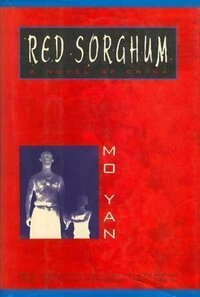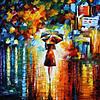Take a photo of a barcode or cover
How I loathe hybrid sorghum.
Reading this was like hearing my mom tell me stories when I was little. The romantic prose bordering on poetry, yet mixed with gruesome detail. The disjoint narratives. The remembering of family history.
Reading this was like hearing my mom tell me stories when I was little. The romantic prose bordering on poetry, yet mixed with gruesome detail. The disjoint narratives. The remembering of family history.
"Sorgul roșu" de Mo Yan nu este printre cărțile mele preferate de la autor, nu a fost ceea ce mi-aș fi dorit, dar i-am acordat trei steluțe pe GR datorită stilului său pe care îl ador. Ca restul lucrărilor sale, nici în acest roman nu lipsesc violența, cruzimea și ciudățeniile lumii în care trăim. Prezentând o familie pe mai mult generații, Mo Yan scrie o carte în care războiul, moartea și suferința se împletesc cu o cultură bogată și cu însăși viața. Mi-a plăcut să îi urmăresc povestea lui Dai Fenglian — în special — și prin ceea ce a trecut ea.
"Cerule... m-ai înzestrat cu un om iubit, m-ai înzestrat cu un copil, m-ai înzestrat cu bogăție, m-ai înzestrat cu treizeci de ani de viață la fel de împlinită ca sorgul roșu. (...) Am iubit fericirea, am iubit tăria, am iubit ce e frumos, trupul meu a fost al meu, mi-am fost singură stăpână, nu mi-a fost frică să păcătuiesc, nu mi-a fost frică de pedeapsă... "
"Cerule... m-ai înzestrat cu un om iubit, m-ai înzestrat cu un copil, m-ai înzestrat cu bogăție, m-ai înzestrat cu treizeci de ani de viață la fel de împlinită ca sorgul roșu. (...) Am iubit fericirea, am iubit tăria, am iubit ce e frumos, trupul meu a fost al meu, mi-am fost singură stăpână, nu mi-a fost frică să păcătuiesc, nu mi-a fost frică de pedeapsă... "
Mo Yan’dan daha önceden İri Memeler ve Geniş Kalcalar kitabını okumuştum. Orada da yine bir aile kronolojisini bu sefer kültür devrimi eşliğinde veriyordu. Bu sefer dönem değişiyor. 1923 yılından başlayıp üç kuşağa yayınlan kan, aşk, savaş ve şiddetle dolu bir aile seceresi. Benim için okuması oldukça zor bir kitaptı. Sayfalarca süren savaş, kaza, şiddet ölüm ve parçalanmış bedenlerin tasvirleri o kadar detaylı ki insanın ruhunu karartıyor. Hatta artık sonlara doğru yaklaşırken artık yazarın kızıl darı tarlalarındaki tüm vahşeti ve sefaleti anlatmaktan yorulduğu hissine kapılıyor insan. Kesinlikle insanı iyi hissettiren kitaplardan birisi değil. Ancak dili baştan sona çok etkileyici. İnsanların ve çevrenin pitoresk tasvirleri ve şiirsel anlatımı çok güzel. Ancak ben bir süreMo Yan’a mola verme ihtiyacı duyuyorum zira betimlemeleri o kadar güçlü ki, insanı yoruyor. Askerleri parçalayan kılıçların, ölmek üzereyken bağırsaklarını bebek kucaklar gibi tutan adamların ve ceset yiyen köpeklerin zihnimden temizlenmesine ihtiyacım var.
“Tanrım, iffet nedir? Neye doğru yol denir? İyilik nedir? Kötülük nedir? Bana hiç söylemedin, ben hep kendi fikrimce yaşadım, mutluluğa aşığım, gücü severim, güzeli severim, bedenim benim bedenimdir, kendi kararlarımı kendim alırım, günahtan korkmam, cezadan korkmam, senin on sekiz katlı cehenneminden korkmuyorum. Yapmam gerekenlerin hepsini yaptım, halletmem gerekenleri hallettim, hiçbir şeyden korkmuyorum. Ama ölmek istemiyorum, yaşamak istiyorum, bu dünyaya daha fazla bakmak istiyorum, ah, Tanrım...”
adventurous
challenging
dark
emotional
sad
tense
medium-paced
Plot or Character Driven:
Character
Strong character development:
No
Loveable characters:
Complicated
Diverse cast of characters:
Yes
Flaws of characters a main focus:
No
3.5 stars
Not as enjoyable for me as Frog by the same author: the writing is exceptionally flowery, in a way I don’t like + the plot is so non linear I kept getting confused as to what generation and time period was being referenced. Sometimes alternate paragraphs on the same page were switching back and forth it was that convoluted. That’s really all that drags the rating down though.
Ignoring structure, the plot is interesting and there are many striking cinematic scenes that when laid out in Mo Yan’s elaborate use of language have vibrancy distilled into them. My favourite was when they fight the army of dogs, attempting to stop them tearing into the corpses of the villagers.
Might add more to this review at some point but I’m slightly drunk and very tired so I’m going to bed now haha
Not as enjoyable for me as Frog by the same author: the writing is exceptionally flowery, in a way I don’t like + the plot is so non linear I kept getting confused as to what generation and time period was being referenced. Sometimes alternate paragraphs on the same page were switching back and forth it was that convoluted. That’s really all that drags the rating down though.
Ignoring structure, the plot is interesting and there are many striking cinematic scenes that when laid out in Mo Yan’s elaborate use of language have vibrancy distilled into them. My favourite was when they fight the army of dogs, attempting to stop them tearing into the corpses of the villagers.
Might add more to this review at some point but I’m slightly drunk and very tired so I’m going to bed now haha
Yan's writing is wonderfully detailed and he infuses beauty and grotesqueness throughout the novel. I could have done with out the extreme violence and slightly depressing tone.
I find it entertaining in a more analysing way. Thinking how war time was, how much the author’s own thought affect the portraying of the Communism Part, the Japanese.
I really like all his metaphors with sorghum and his whole motive around it. But that is probably it. I thought the book would be more about relationships than.. war. The dog war turned me off and this whole book is currently forced into my brain cuz i was too weak to dnf it.
I really like all his metaphors with sorghum and his whole motive around it. But that is probably it. I thought the book would be more about relationships than.. war. The dog war turned me off and this whole book is currently forced into my brain cuz i was too weak to dnf it.
I have struggled with this book twice now and for the second time I decided to put it aside for other books that interest me more. I rarely ever put a book aside; but I was so disappointed and what small issues I had in the beginning have become more frustrating.
The story in itself is definitely interesting and captivating. Horrible, and so tragic. It's just that I don't feel any connection what so ever to the characters. I care nothing for what happens to them, and in a story so horrid and dark that means something is off. I think the dialogue is the guilty party. It feels forced and theatrical. The author has spent a lot of energy on describing the surroundings, the nature and the landscape but not much at all on the characters themselves. The dialogue is theatrical and dramatic and any small event is as large as it possibly can be. It doesn't feel real and certainly doesn't move me when I can't take a book seriously because of the tone of voice.
It is a pity and I am disappointed as I expected far more. It started out well, but the author repeats himself far too often for my taste. I will put this aside for now and I don't know when or if I will pick it up again.
The story in itself is definitely interesting and captivating. Horrible, and so tragic. It's just that I don't feel any connection what so ever to the characters. I care nothing for what happens to them, and in a story so horrid and dark that means something is off. I think the dialogue is the guilty party. It feels forced and theatrical. The author has spent a lot of energy on describing the surroundings, the nature and the landscape but not much at all on the characters themselves. The dialogue is theatrical and dramatic and any small event is as large as it possibly can be. It doesn't feel real and certainly doesn't move me when I can't take a book seriously because of the tone of voice.
It is a pity and I am disappointed as I expected far more. It started out well, but the author repeats himself far too often for my taste. I will put this aside for now and I don't know when or if I will pick it up again.
This is my first encounter of Mo Yan's work. True, I never heard his name before his Nobel inauguration and I regret not to meet him sooner. My first impression: ruthless in telling story, compassionate for his protagonist (women, most of the time), cinematic in depicting landscape and had a talent to fuse the morbid and the beautiful.
THE STORY
Red Sorghum, like most of his works, take place in Northeast Gaomi Township during the war with Japan in 1931 - 1941 (the Japanese Occupation officially occur 1937-1945). It is a family saga in which Yu Zhan'ao is the head. Born from a poor family and raised in the midst of infidelity, he became a bandit and later, national hero. During a brief spell of stability in his life, he became a worker for a firm helping people with traditional ceremony (a coffin bearer for burial or bride's-palanquin bearer for wedding ceremony). A job for bride's-palanquin bearer made him met his wife (the bride he is supposed to carry), his lover, the object of his stormy desire and set his turbulent life into motion.
The already stormy relationship soon turn into disarray with the coming of the Japanese and the fights between the Chinese themselves during the time of resistance. Yu Zhan'ao, the guerilla leader, and his family became the center of this tragedy where men were butchered, women were raped, kids and olds were faced with bullets and bayonets in the valley near the river where sorghum grows. Its buds red like blood and the ground they grow on black by blood of fallen men.
THE STYLE
Mo Yan writes in cinematic chapters that fused the man and the landscape, the emotions and the natural phenomenon. He is ruthless in describing the chaos of war, the head that split from the body, the internal organs that came out from split belly, all told in gritty details. But he also portrays lanscape beauty with majestic, magical poetry, with eye of a painter. He fused objective observation with peasant's superstitions. He blend the myth and the history. I think he writes in yin and yang.
THE THEME
Men's relentless desire to live, to adapt with horrible forces of war and disaster is heavily explored here. Like stalks of sorghum that grow ever tall during times of disaster and war, the human also rise and rise again to repeat the folly of war and contest of power. Human's animalistic tendency is also a central theme here.
The third chapter "Dog Ways" realistically portrays horrifying parable of human behaviour during times of crisis: the alpha dogs fight for power while the lesser dogs become collateral damage. Stray dogs, increasing in numbers during war, begin to eat men's corpses, the casualty of war. Dogs who eat human corpses grow healthier with beautiful fur and so does the hungry men who hunt dogs for meat. Men who eat dogs grow healthier and more able bodied for war. And thus the eat-or-be-eaten world beautifully pictured in haunting passage.
NARRATIVE FLOW
The story told not in linear timeline but more like a mosaic where a chapter can flow into the past of into the future triggered by memory, or taste, or a vivid panorama. Imagine a movie that flashback into the past with a narrator that tell the future beforehand.
LAST WORDS
I love it! I love it! I recommend this book to those who want the first taste of Chinese Literature; like wine: chaotic, strong and filled with the taste of life.
THE STORY
Red Sorghum, like most of his works, take place in Northeast Gaomi Township during the war with Japan in 1931 - 1941 (the Japanese Occupation officially occur 1937-1945). It is a family saga in which Yu Zhan'ao is the head. Born from a poor family and raised in the midst of infidelity, he became a bandit and later, national hero. During a brief spell of stability in his life, he became a worker for a firm helping people with traditional ceremony (a coffin bearer for burial or bride's-palanquin bearer for wedding ceremony). A job for bride's-palanquin bearer made him met his wife (the bride he is supposed to carry), his lover, the object of his stormy desire and set his turbulent life into motion.
The already stormy relationship soon turn into disarray with the coming of the Japanese and the fights between the Chinese themselves during the time of resistance. Yu Zhan'ao, the guerilla leader, and his family became the center of this tragedy where men were butchered, women were raped, kids and olds were faced with bullets and bayonets in the valley near the river where sorghum grows. Its buds red like blood and the ground they grow on black by blood of fallen men.
THE STYLE
Mo Yan writes in cinematic chapters that fused the man and the landscape, the emotions and the natural phenomenon. He is ruthless in describing the chaos of war, the head that split from the body, the internal organs that came out from split belly, all told in gritty details. But he also portrays lanscape beauty with majestic, magical poetry, with eye of a painter. He fused objective observation with peasant's superstitions. He blend the myth and the history. I think he writes in yin and yang.
THE THEME
Men's relentless desire to live, to adapt with horrible forces of war and disaster is heavily explored here. Like stalks of sorghum that grow ever tall during times of disaster and war, the human also rise and rise again to repeat the folly of war and contest of power. Human's animalistic tendency is also a central theme here.
The third chapter "Dog Ways" realistically portrays horrifying parable of human behaviour during times of crisis: the alpha dogs fight for power while the lesser dogs become collateral damage. Stray dogs, increasing in numbers during war, begin to eat men's corpses, the casualty of war. Dogs who eat human corpses grow healthier with beautiful fur and so does the hungry men who hunt dogs for meat. Men who eat dogs grow healthier and more able bodied for war. And thus the eat-or-be-eaten world beautifully pictured in haunting passage.
NARRATIVE FLOW
The story told not in linear timeline but more like a mosaic where a chapter can flow into the past of into the future triggered by memory, or taste, or a vivid panorama. Imagine a movie that flashback into the past with a narrator that tell the future beforehand.
LAST WORDS
I love it! I love it! I recommend this book to those who want the first taste of Chinese Literature; like wine: chaotic, strong and filled with the taste of life.







